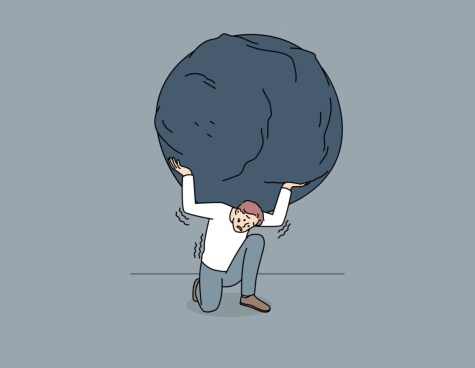
Mea Marvin | Opinion Editor
January 17, 2024
“New year, new me.”
This famous – or rather infamous– cliche plagues the air every holiday season. This is a loaded phrase with so many different layers. A majority of the population takes this “chance” for a fresh start to begin working out more, be less stressed, or save up money. Marketing preys upon this opportunity to sell as much as they possibly can, knowing that this time of year is when consumers are most vulnerable.
But why does it seem so essential to people to wait until the clock strikes midnight?
Again, layers. It is always about complex and confusing layers. The answer may seem obvious to most people, but that so-called apparent conclusion is not drawn the same way. Junior Ana Benito expressed that “a lot of people think of New Year‘s resolutions… they want to have new change.” This is understandable, of course, as many desire to set goals for themselves. Ana shared that “[She] makes New Year’s resolutions every year and [she] tries to meet them.” This is a wonderful concept that everyone should seek out. December 31st is a common time for self-reflection.

The thing is, self-improvement should be a constant skill that everyone works on. Change takes time and effort, and should not start every time a calendar marks that another year has passed. Taking small steps throughout the year and taking experiences learned along the way is infinitely more effective than using the crutch that is the new year. If saving money is important, then create a budget that is meticulously planned out for the current situation. There is no point in designating a time at the very end of the year to start improving yourself or your life.
Life is constantly changing. Whether that shift is good or bad, setting New Year‘s resolutions could possibly lead to disappointment in oneself for not reaching impossible standards. The idea of “new year, new me” sets a negative precedent that if you fail to meet every single one of your goals, you are a failure. This just isn’t realistic in the complexity of life. If you feel like you want to improve yourself, do it as soon as possible with the preconception that you are a human who will make mistakes.
Senior Ava Knochenhaur asserted that “people don’t need to hold off on achieving their goals until a new year.” Resolutions are a wonderful idea to perpetuate self-improvement or change, yet they should be happening every day. Expecting too much all at once is an overwhelming abstraction that can often cause more bad than good. Taking small steps and thinking about little things as a way of changing is more powerful than one might believe. If you want to do things differently, don’t wait. It doesn’t need to be grand or even public, making little changes every day can have such a big impact.

Leave a Reply